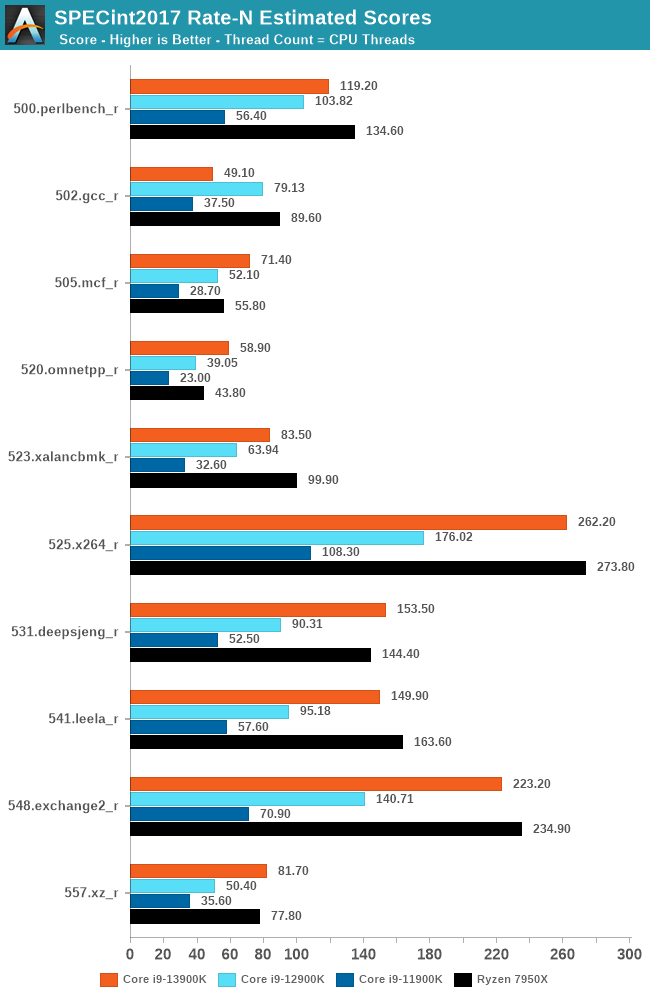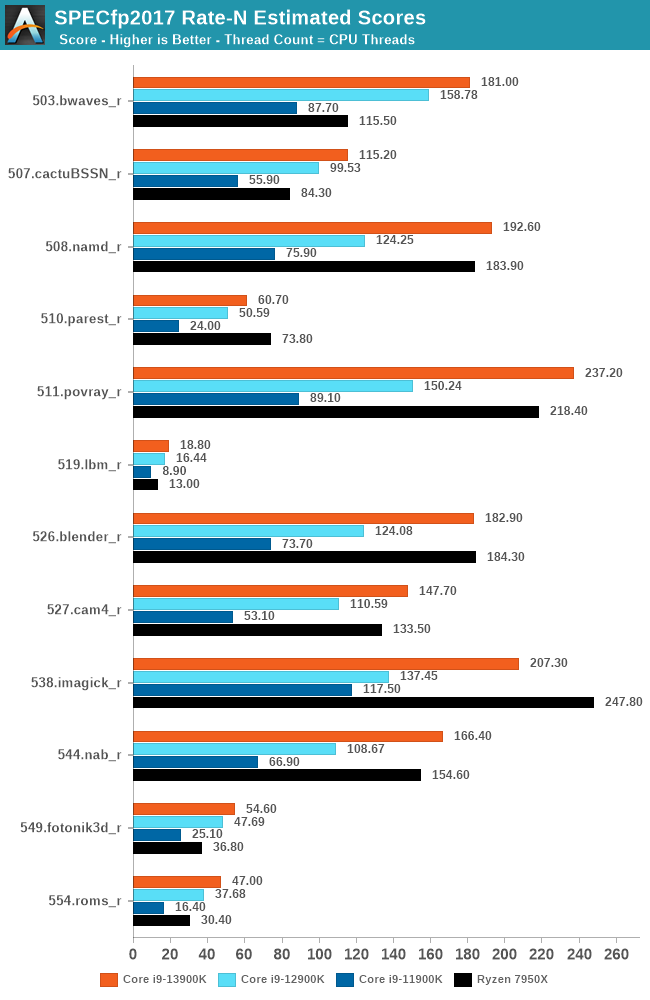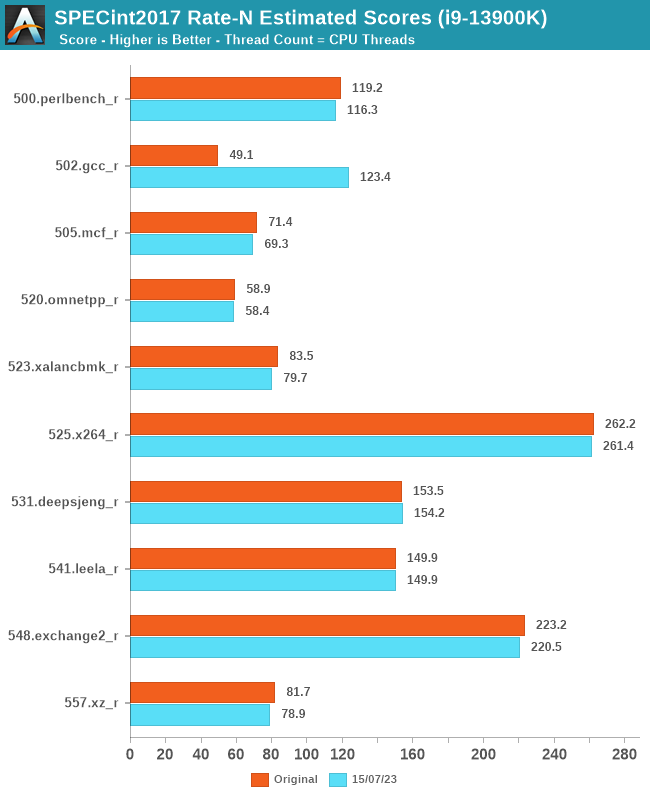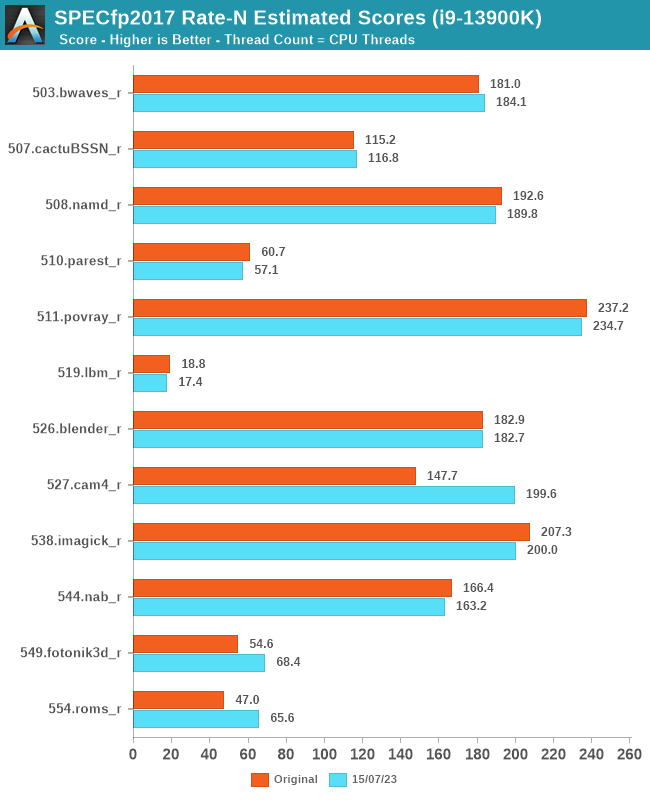Intel Core i9-13900K and i5-13600K Review: Raptor Lake Brings More Bite
by Gavin Bonshor on October 20, 2022 9:00 AM ESTSPEC2017 Multi-Threaded Results
Single-threaded performance is only one element in regard to performance on a multi-core processor, and it's time to look at multi-threaded performance in SPEC2017. Although things in the single-threaded SPEC2017 testing showed that both Zen 4 and Raptor Lake were consistently at loggerheads, let's look at data in the Rate-N multi-threaded section.

Looking at the data in our first part of SPEC2017 (int) nT testing, we're seeing similar trade-offs between Raptor Lake (13th Gen) and Zen 4 (Ryzen 7000) platforms. While Raptor Lake won in the 500.perlbench_r single-threaded test, Zen 4 has the lead by around 13% in multi-threaded performance, despite the Core i9-13900K having eight more physical cores (albeit efficiency cores).
One stand-out part of our SPECint2017 multi-threaded testing is just how far ahead the Core i9-13900K is ahead of the previous Core i9-12900K in multi-threaded tests. This comes thanks to more cores (2x the E-cores), and higher turbo frequencies. For example, in the 525.x264_r test, the Core i9-13900K is nearly 50% better than the i9-12900K; the only part where Raptor Lake failed to outperform Alder Lake was in the 502.gc_r test.

Moving onto the second half of our SPEC2017 multi-threaded results (Floating Point), the Core i9-13900K really does show itself to be a formidable force compared to Zen 4. In the majority of SPECfp2017 tests, the Core i9-13900K is ahead in multi-threaded performance. The improvements in overall performance from Rocket Lake (11th Gen) to Alder Lake were decent, but the improvement from Rocket Lake last year in Q1 2021 to Raptor Lake today – a more useful metric for the usual 2-4 year hardware upgrade cycle – is very impressive indeed.
Summarizing the SPEC2017 multi-threaded results, in some areas Zen 4 is the winner, some areas Raptor Lake (Raptor Cove + Gracemont) is the winner. It is incredibly close in quite a few of the tests, and without sounding negative on the Zen 4 architecture here, but Intel has done a very good job bridging that initial gap to make things competitive against AMD's best.
Update 18/07/23
Following on from our initial results in our SPECint2017 Rate multi-threaded testing of the Core i9-13900K, we wanted to investigate the 502.gcc_r result, which we believed to be an anomaly of sorts. We observed a score of 49.1 on the Core i9-13900K, which, compared to the previous generation Core i9-12900K, is a regression in performance; the result was around 37% lower than the previous generation.
To investigate further, we've re-tested the Core i9-13900K using SPEC2017 Rate to identify any issues and to see if we could further replicate the issue or, at the very least, provide a more up-to-date list of results.

Looking at our updated SPECin2017 results, we are comparing the original Core i9-13900K data to the new data for comparative purposes. Although the results are very similar in many cases, we can see some slight regression in a few results, which could be attributed to various factors, including Windows 11's scheduler, power budget, or just general variance in running.
The biggest highlight of our re-test is the 502.gcc_r result, which seems to be an anomaly for the original run. We've run SPEC2017 numerous times to confirm that the above results are exactly where they should be.

Focusing on our latest results for SPECfp2017 Rate N, we can see a similar story, with very similar results in multi-threaded SPEC2017 performance as with our original testing. In fact, a couple of the results yielded slightly higher results, which could be simply down to scheduler maturity, OS-related improvements including the scheduler, or overall firmware maturity. The results include 527.cam4_r, 549.fotonik3d_r, and 554.roms_r, which show better gains in our latest testing, especially compared to the Core i9-12900K, which this chip replaced in the market.
The biggest takeaway from our re-testing is the updated SPECint2017 Rate-N result for 502.gcc_r, which shows that our original results were nothing more than an anomaly, and we've been unable to replicate the issue.
Update: 07/22/23
We are aware of potential issues with memory capacity, and as such, we are re-running the Core i9-13900K with higher capacity DDR5 memory at JEDEC settings relevant to the platform. We have done a run with 64 GB instead of the regular 32 GB, which with the Core i9-13900K is 2 GB per thread (2 GB x 32 = 64 GB). Looking at preliminary results, we aren't seeing any major variances in these results.










169 Comments
View All Comments
mode_13h - Friday, October 21, 2022 - link
"The new instruction cache on Gracemont is actually very unique. x86 instruction encoding is all over the place and in the worst (and very rare) case can be as long as 15 bytes long. Pre-decoding an instruction is a costly linear operation and you can’t seek the next instruction before determining the length of the prior one. Gracemont, like Tremont, does not have a micro-op cache like the big cores do, so instructions do have to be decoded each time they are fetched. To assist that process, Gracemont introduced a new on-demand instruction length decoder or OD-ILD for short. The OD-ILD generates pre-decode information which is stored alongside the instruction cache. This allows instructions fetched from the L1$ for the second time to bypass the usual pre-decode stage and save on cycles and power."Source: https://fuse.wikichip.org/news/6102/intels-gracemo... Reply
Sailor23M - Friday, October 21, 2022 - link
Interesting to see Ryzen 5 7600X perform so well in excel/ppt benchmarks. Why is that so? ReplyMakste - Friday, October 21, 2022 - link
Thank you for the review. So Intel too, is finally throwing more cores and increasing frequencies to the problem these days, which increases heat and power usage in turn. AMD too, is a culprit of this practice but has not gone to these lengths as Intel. 16 cores versus supposedly efficiency cores. What is not happening? Replyricebunny - Friday, October 21, 2022 - link
It would be a good idea to highlight that the MT Spec benchmarks are just N instantiations of the single thread test. They are not indicative of parallel computing application performance. There are a few dedicated SPEC benchmarks for parallel performance but for some reason they are never included in Anandtechs benchmarks. ReplyRyan Smith - Friday, October 21, 2022 - link
"There are a few dedicated SPEC benchmarks for parallel performance but for some reason they are never included in Anandtechs benchmarks."They're not part of the actual SPEC CPU suite. I'm assuming you're talking about the SPEC Workstation benchmarks, which are system-level benchmarks and a whole other kettle of fish.
With SPEC, we're primarily after a holistic look at the CPU architecture, and in the rate-N workloads, whether there's enough memory bandwidth and other resources to keep the CPU cores fed. Reply
wolfesteinabhi - Friday, October 21, 2022 - link
its strange to me that when we are talking about value ...especially for budget constraint buyers ... who are also willing to let go of bleeding edge/performance ... we dont even mention AM4 platform.AM4 is still good ..if not great (not to say mature/stable) platform for many ..and you can still buy a lot of reasonably price good procs including 5800X3D ...and users have still chance to upgrade it upto 5950X if they need more cpu at a later date. Reply
cowymtber - Friday, October 21, 2022 - link
Burning hot POS. ReplyBernieW - Friday, October 21, 2022 - link
Disappointed that you didn't spend more time investigating the serious regression for the 13900K vs the 12900K in the 502.gc_r test. The single threaded test does not have the same regression so it's a curious result that could indicate something wrong with the test setup. Alternately, perhaps the 13900K was throttling during that part of the test or maybe E cores are really not good at compiling code. ReplyAvalon - Friday, October 21, 2022 - link
I had that same thought. Why publish something so obviously anomalous and not even say anything about it? Did you try re-testing it? Did you accidentally flip the scores between the 12th and 13th gen? There's no obvious reason this should be happening given the few changes between 12th and 13th gen cores. ReplyRyan Smith - Friday, October 21, 2022 - link
"Disappointed that you didn't spend more time investigating the serious regression for the 13900K vs the 12900K in the 502.gc_r test."We still are. That was flagged earlier this week, and re-runs have produced the same results.
So at this point we're digging into matters a bit more trying to figure out what is going on, as the cause is non-obvious. I'm thinking it may be a thread director hiccup or an issue with the ratio of P and E cores, but there's a lot of different (and weird) ways this could go. Reply